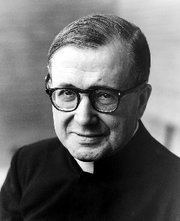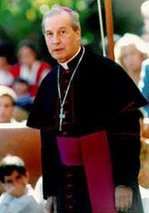影片对白 We don't pick and choose which rules to follow. We follow doctrine. Rigorously.
文化面面观
Opus Dei vs Cafeteria Catholic
1. Opus Dei

|
| Josemaría Escrivá, the founder of Opus Dei |
Opus Dei, Roman Catholic organization, particularly influential in Spain, officially the Prelature of the Holy Cross and Opus Dei. Opus Dei was founded in 1928 by a wealthy lawyer turned priest, José María Escrivá de Balaguer y Albás, who objected to the liberal, secular atmosphere at the Univ. of Madrid. As a Catholic institution, it emphasizes that ordinary Christians can achieve holiness and change society for the better through how they live their everyday lives. Opus Dei gained national importance in Spain after the civil war, when it received support from goverment of Francisco Franco. In the 1950s and 60s it replaced the Falange as the most important conservative political and religious force in Spain. Its influence there, however, has waned since the early 1970s.
Receiving increased support from the Vatican since the late 1970s, the organization has grown to more than 85,000 members in more than 80 countries. In 1950 the Vatican recognized it as a secular institute; in 1982 it was given the status of “personal prelature.” Its membership is now, therefore, considered a separate diocese with its own bishop.
Believing that a Catholic can lead a holy life without taking religious vows, lay members pledge to serve God in worldly vocations; roughly a third of the members live communally and celibately in Opus Dei centers. The movement seeks to promote traditional Catholic values and teaching and to oppose liberalism and immorality, and is noted for its emphasis on preaching to government officials, professionals, intellectuals, and business executives. Opus Dei has been controversial among some Catholics because of its secretive nature, its emphasis on discipline, its conservatism, and its historical association with the Franco regime in Spain. This controversy became pronounced in 1992 when the Vatican, under John Paul II, beatified Escrivá; Escrivá was canonized in 2002.

|
| Monsignor Javier Echevarria, the current Prelate of Opus Dei |
需要说明的是,在《达•芬奇密码》中,许多关于Opus Dei 的描写是错误的。For example, the major villain in The Da Vinci Code is a monk who is member of Opus Dei — but in reality there are no monks in Opus Dei. The Da Vinci Code implies that Opus Dei is the Pope's personal prelature — but the term "personal prelature" does not refer to a special relationship to the Pope: It means an institution in which the jurisdiction of the prelate is not linked to a geographic territory but over persons, wherever they be. Nonetheless, Brown claims that his portrayal of Opus Dei was based on interviews with members and ex-members, and books about Opus Dei. An Opus Dei spokesman questions this claim.
2. Cafeteria Catholic
The term Cafeteria Catholic (also à la carte Catholic or CINO = "Catholic In Name Only") is a pejorative or an insulting characterization and is used to describe people who dissent from certain teachings of the Roman Catholic Church while maintaining an identity as Catholics. These people are said to view the Church much like a "cafeteria", where one picks and chooses only those items that appeal to them. The term is typically applied to those who blatently dissent from selected Catholic moral teaching on issues such as abortion, contraception, premarital sex, and homosexuality. The term is less frequently applied to those who dissent from other Catholic moral teaching on issues such as social justice, capital punishment, or just war. Groups labeled as such include Call to Action, FutureChurch, DignityUSA, and Catholics for a Free Choice. Some of those who employ the term in their vocabulary accuse those who view the term pejoratively of believing dissent from the constant teaching of the Church to be a form of devoutness.
It should be noted that the epithet is not created, used, or endorsed by official church teaching.
考考你
将下面的句子译成汉语。
1. 伊拉克和谈将在芬兰结束。
2. 使用一些能帮你“加强重点”的技巧。
Click《人生遥控器》(精讲之九)考考你 参考答案
1. 约翰一直走了六个小时才到他朋友家。
John walked six hours straight to get to his friend’s house.
2. 我希望我们的计划不会失败。
I hope our plans won't fall through.
影片对白 We don't pick and choose which rules to follow. We follow doctrine. Rigorously.